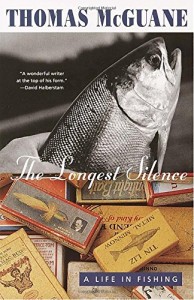 Lovers of nature writing and fishing must know this autobiographical collection of essays about fishing by Thomas McGuane. The author tells us thirty-three stories from his childhood to adulthood that takes you to fishing games around the world. From tarpon fishing in Florida, to salmon in Iceland, from bonefish in Mexico, to Argentina and to Russia to trout fly fishing in Montana, McGuane delivers here his vision of the world .
Lovers of nature writing and fishing must know this autobiographical collection of essays about fishing by Thomas McGuane. The author tells us thirty-three stories from his childhood to adulthood that takes you to fishing games around the world. From tarpon fishing in Florida, to salmon in Iceland, from bonefish in Mexico, to Argentina and to Russia to trout fly fishing in Montana, McGuane delivers here his vision of the world .
For him and as for John Gierach, fishing games are also a philosophical experience. The fisherman must be attentive to what surrounds him, so he has to open himself to the world, to nature in order to observe with attention the living world (animal and biological).
Thus the man can find its way back on this Earth as a human being. These thoughts can be applied to hunting, bird watching or any other activity that requires attention, and silence. It is by keeping silent that the outside world will open up to you.
“What is most emphatic in angling is made so by the long silences – the unproductive periods. For the ardent fisherman, progress is towards the kinds of fishing that are never productive in the sense of the blood riots of the hunting-and-fishing periodicals. Their illusions of continuous action evoke for him, finally, a condition of utter, mortuary boredom. Such anglers will always be inclined to find the gunnysack artists of the heavy kill rather cretinoid, their stringer-loads of gaping fish appalling.”
Thomas McGuane simply gives his philosophy letters to a long-disgraced activity.
Through his memories of childhood, the author reminds us of the importance of our attachment to nature. Thomas McGuane is a writer and his talent shows off when he evokes his philosophical reflections or when he enjoys portraying characters encountered during his long wanderings.
I must admit, however, that I found the number of narratives too important (33) with a feeling of repetitive stories. I advise to keep this book at your bedside table, and to read it from time to time, not in one setting.
The other weak point of the novel is that if you are not a fisherman, the technical vocabulary and the details of the fishing exercise make certain passages very complicated to understand and I admit to have deliberately overread certain parts. Also many fishes were totally unknown to me.On the other hand, fishing enthusiasts will find here a wealth of technical information.
This collection is indeed a true declaration of love to nature. This activity will inevitably push the fisherman in a certain loneliness, but as McGuane clearly states, loneliness is not the same as isolation. These are times when the fisherman, withdrawing himself from society, rediscovers its true self.
« We have reached the time in the life of the planet, and humanity’s demand upon it, when every fisherman will have to be a river-keeper, a steward of marine shallows, a watchman on the high seas. We are beyond having to put back what we have taken out. We must put back more than we take out ».

 Français
Français